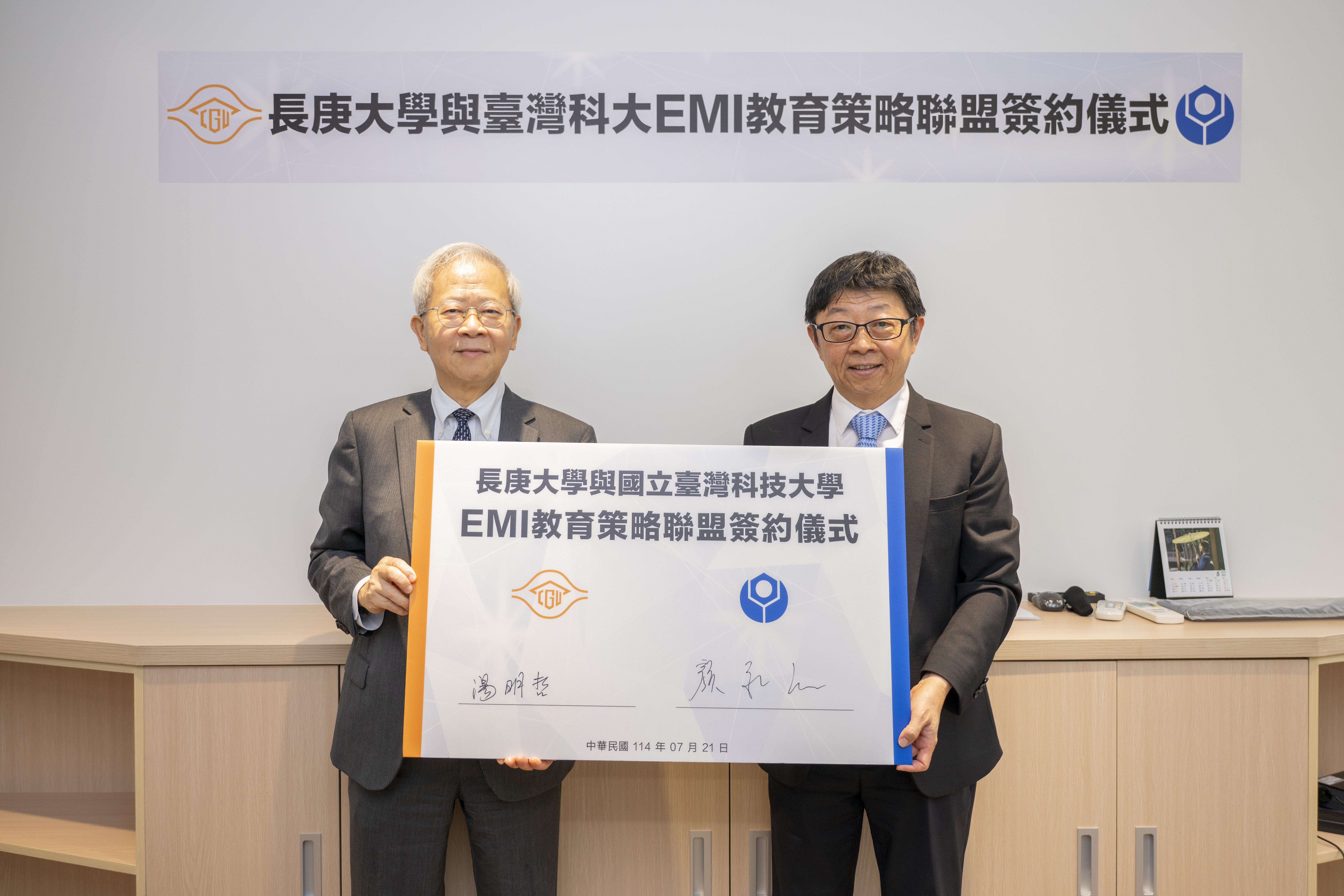Taiwan Tech and Chang Gung University team up for Bilingual Education Innovation.
To promote Taiwan’s national bilingual policy and enhance students’ international competitiveness, Taiwan Tech and Chang Gung University have officially signed a Memorandum of Understanding for an EMI Education Strategic Alliance. The agreement affirms the two universities’ commitment to integrating their respective academic strengths and distinctive curriculum resources to deepen bilingual teaching collaboration. Both institutions will jointly develop and share EMI/ESP (English for Specific Purposes) course content, realizing the cooperative vision of “shared resources, shared students, and co-created teaching.” The partnership aims to build a more flexible and substantively interactive bilingual teaching ecosystem.

Taiwan Tech President Chia-Ju Yen (right) and Chang Gung University President Ming-Je Tang (left) jointly signed the Memorandum of Understanding for the EMI Education Strategic Alliance, affirming the two universities’ commitment to integrating their respective academic strengths and distinctive curriculum resources to deepen bilingual teaching collaboration.
Taiwan Tech has been cultivating internationalized teaching for more than 20 years and is one of six EMI Teaching and Learning Centers designated by the Ministry of Education. It is also the only university of science and technology in Taiwan that was selected as a “BEST Program Key Cultivation University” by the Ministry. Building on the institutional framework and practical experience accumulated through Taiwan Tech’s EMI Teaching and Learning Center, this collaboration will jointly offer EMI professional and general education courses, allow students to cross-register without paying credit fees, and promote faculty professional development, teaching assistant training, administrative staff workshops, and exchange visits.
In addition, the two universities will work together to establish a teaching platform, strengthen student learning support, and build professional communities. They will explore innovative models such as joint EMI faculty training, cross-campus class observations, and interactive exchanges. The partnership will also co-host EMI-related forums and seminars, jointly apply for industry–government–academia collaboration projects, and deepen the practice and research of bilingual education. The ultimate goal is to create a flexible, effective bilingual teaching community that comprehensively enhances teaching quality and innovation.

Participants discussed the implementation of the two universities’ bilingual programs and future directions for collaboration.
At the signing ceremony, Taiwan Tech President Jia-Yush Yen noted that one of the most important challenges currently facing the university is how to effectively guide Taiwan Tech students to increase their acceptance of bilingual teaching and actively engage in bilingual learning. Yen emphasized that the promotion of Taiwan’s national bilingual policy is not only a reform in language education but also a key opportunity to advance the internationalization of higher education. By partnering with Chang Gung University, she hopes to establish a cross-campus resource-sharing mechanism with tangible benefits, providing more students with a high-quality learning environment with a global perspective, thereby improving learning efficiency.
Chang Gung University President Ming-Je Tang stated that bilingual education is an important mission they are actively pursuing and continuously exploring. While it remains challenging for many university students - particularly given that students’ motivation to learn English is not always high, the university must invest more resources and effort. Working together with Taiwan Tech, they will seek practical solutions. Tang also shared that in the future, the university will explore integrating AI technology to assist English learning to boost student engagement and learning outcomes. With a touch of humor, he likened the two universities to “ducklings paddling hard in the waves of bilingual education,” expressing his hope that through this alliance, both sides can grow together, mutually benefit, and eventually “spread their wings to become swans soaring across the sky.”
Chang Gung University’s strong foundation in biomedical sciences, healthcare, and smart technology complements Taiwan Tech’s focus on engineering, electrical and information sciences, and management - key areas in EMI development. This collaboration will not only expand EMI teaching venues but also give students more opportunities to enroll in cross-campus and EMI courses. Faculty, teaching assistants, and administrative teams will benefit from workshops, seminars, and professional exchanges, sparking teaching creativity and sharing hands-on experience. Together, the two universities aim to enhance the overall capacity and quality of bilingual teaching, exemplifying a model of higher education cooperation that keeps student learning at its core.

Taiwan Tech President Jia-Yush Yen (front row, third from left) led members of the EMI Teaching and Learning Center and the Office of Bilingual Education Initiatives to attend the signing ceremony, engaging in in-depth discussions with Chang Gung University’s bilingual teaching team on future models and practical strategies for bilingual education collaboration.